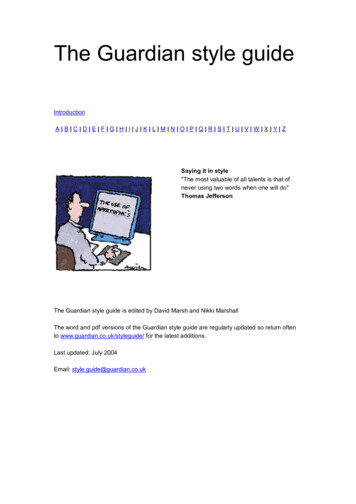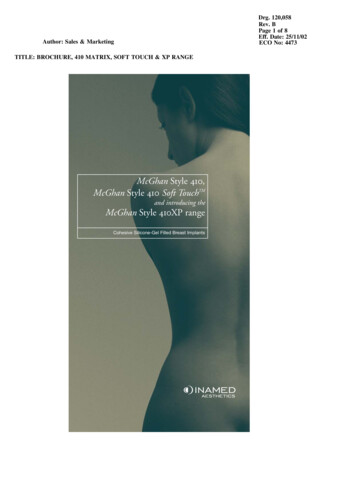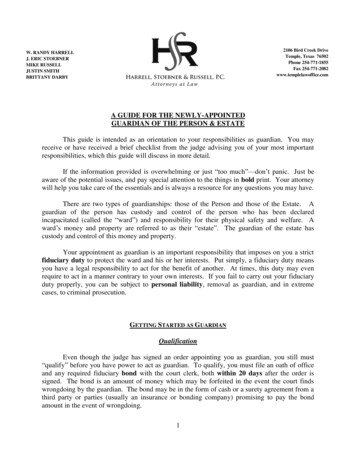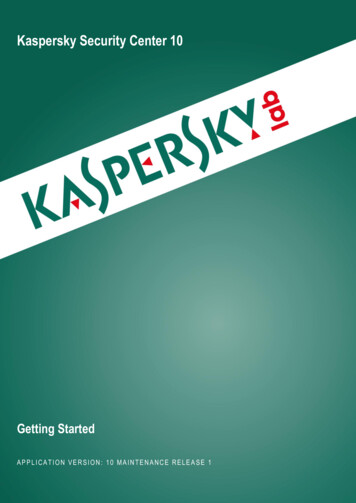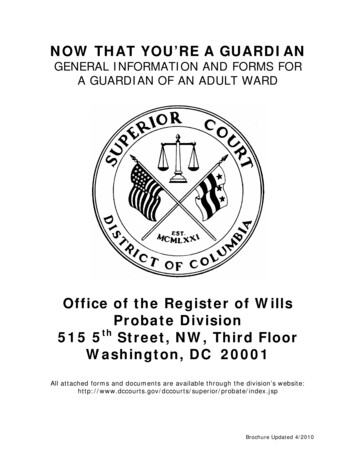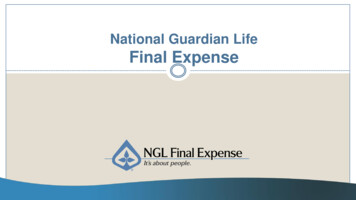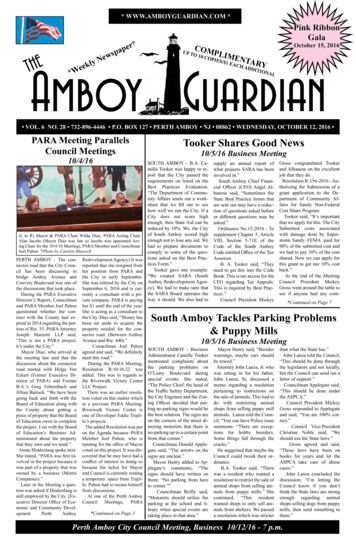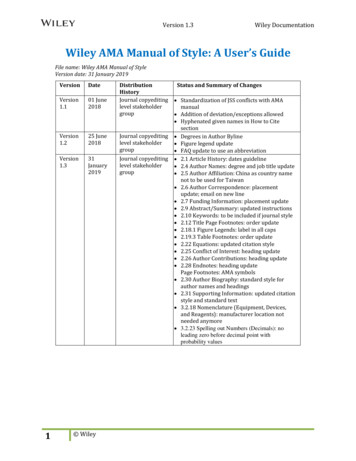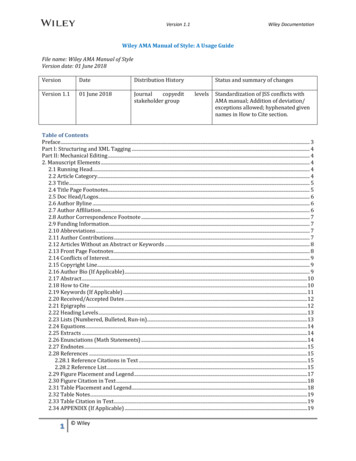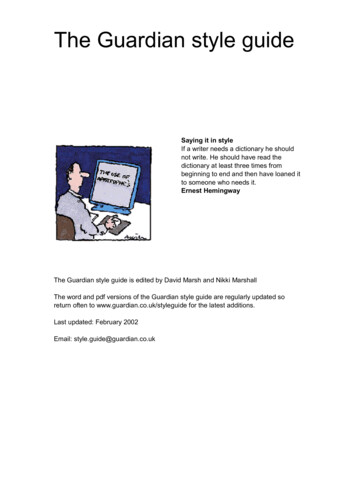
Transcription
The Guardian style guideSaying it in styleIf a writer needs a dictionary he shouldnot write. He should have read thedictionary at least three times frombeginning to end and then have loaned itto someone who needs it.Ernest HemingwayThe Guardian style guide is edited by David Marsh and Nikki MarshallThe word and pdf versions of the Guardian style guide are regularly updated soreturn often to www.guardian.co.uk/styleguide for the latest additions.Last updated: February 2002Email: style.guide@guardian.co.uk
TheGuardian style guideNeither pedantic nor wild an introduction by Michael McNayThe Guardian has always been a newspaper for writers, andso a newspaper for readers. All the other skills, copy editing,design, typography, illustration, photography, are there toenhance the writing and to make it more accessible, to makethe paper a more desirable journal to read - though illustrationand photography each has its separate justification as well.(Collins EnglishDictionaryMillenniumEdition) to whichyou should refer forfor guidance onanything that doesnot appear in thestyle guideIt should not be necessary to add that Guardian writers andsubeditors should all be interested in the language, in itsproper use and its development, and that regular trips to booksas wide-ranging as Gower's The Complete Plain Words,Partridge's Usage and Abusage, Orwell's brilliant short essayPolitics and the English Language, Fowler's Modern EnglishUsage, or Kingsley Amis's The King's English, are useful insharpening professional tools as well as for entertainment.One says it should not be necessary, but it is very obvious allround the Guardian office that uncomfortably many peopleinvolved in producing and shaping text for the paper rely moreon the casual question, "What's the style for x?" and thecasual answer, "I think it's probably y." Journalists who are notsufficiently interested in house style to check the house styleguide are not on the face of it very likely to be much interestedin style at all.But our approach to style in its broadest sense is, if anything,more important now than before, first because othernewspapers, which may always have had good writing inspecialist areas, have caught up fast across a whole range ofnews and features; second because the Guardian itselfemploys so many staff on freelance shifts or short contractswho arrive here with no particular idea of what makes thispaper different from others, and even staff journalists who arenever inducted into what values the Guardian holds particularlyclose; third, though more obscurely, because of the arrival ofthe internet: this style guide itself is the first to be published onthe world wide web. That makes it accessible in seconds; itcannot get lost or suffer having coffee spilt on it. But thoughthere is no reason in itself why new publishing methods shouldchange the language for the worse, the example of radio andtelevision shows that it can: at the top end, the bestcorrespondents file spoken reports that could grace thisnewspaper; at the broad base, reporters speak a form ofunlovely but infectious journalese destined only for the rubbish Guardian Newspapers Limited
TheGuardian style guidebin.House style is the means by which a newspaper seeks toensure that where there are permissible variants in spellings,the use of acronyms and so forth, a unified approach to thesematters is adopted to help in disseminating a sense ofrationality and authority in the use of language. What it doesnot mean is imposing a unified writing style on the newspaper.Many of the reporters, columnists, critics and at least oneformer editor who once ran a highly idiosyncratic gossipcolumn and who have enlivened the pages of the Guardianand helped to build its international reputation could hardlyhave done so had they been edited from the beginning into ahomogenous house style. A subeditor can do no worsedisservice to the text before him and thus to the writer, thereader, and the newspaper, than to impose his or her ownpreferences for words, for the shape of sentences and howthey link, for a pedantic insistence on grammar in all cases asit used to be taught in school; in the process destroyingnuances and possibly even the flow of a piece. And I write thisas a career copy and layout editor with the best part of 40years' service on the Guardian and who regards the skillsinvolved in copy editing not just as desirable but essential.Editing involves fine judgment, particularly as the paper has somany sections today serving possibly quite different kinds ofreadership. But fine judgments mean good editing, blanketjudgments mean bad editing. A piece written in the vernacularthat would be inappropriate on the analysis page or even(even?) in a sports column might pass muster in the Guide,where the demotic language of an NME review would becloser to the mark than the high style of Macaulay or CP Scott.And dealing sympathetically with quirks of writing stylecertainly does not preclude tidying up cliche-ridden journalese,verbosity, the latest vogue words and phrases, the words andphrases that flatten out meaning, replace a range of bettermore finely tuned words and concepts, and anaesthetisewriting.The introduction to the Guardian stylebook of 1960, whichitself was a revision to the initial guide published in 1928, washeaded "Neither pedantic nor wild".That much has not changed. Michael McNay joined the Guardian in 1963. Guardian Newspapers Limited
TheGuardian style guidea or an before h?Use an only if the h is silent: an hour, an heir, an honourable man, an honest woman;but a hero, a hotel, a historianabattoirabbeyscap up, eg Rievaulx Abbey, Westminster AbbeyabbreviationsDo not use full points in abbreviations, or spaces between initials: BBC, US, mph, eg,4am, lbw, No 10, PJ O'Rourke, WH Smith, etcSpell out less well known abbreviations on first mention; it is not necessary to spellout well known ones, such as EU, UN, US, BBC, CIA, FBI, CD, Aids, NasaUse all caps only if the abbreviation is pronounced as the individual letters; otherwisespell the word out: the BBC, ICI, VAT, but Isa, NatoBeware of overusing less well known acronyms and abbreviations; they can lookclunky and clutter up text, especially those explained in brackets but then onlyreferred to once or twice again. It is usually simpler to use another word, oreven to write out the name in full a second timeThe rash of contractions such as aren't, can't, couldn't, hasn't, don't, I'm, it's, there'sand what's has reached epidemic proportions (even the horrific "there've" hasappeared in the paper). While they might make a piece more colloquial or easier toread, they can be an irritant and a distraction, and make a serious article soundfrivolous. And they look pretty horrible, particularly when the system attempts tohyphenate themA2, B1463not the A2 road or the main A2Aborigines (noun), Aboriginal (adjective)cap up when referring to native Australiansaborigines (noun), aboriginal (adjective)lc when referring to indigenous populationsabscess Guardian Newspapers Limited
TheGuardian style guideabsorptionabysmalabyssAcasAcas, the advisory, conciliation and arbitration service, at first mention; thereafter justAcasaccentsinclude all accents on French words (but not anglicised French words such as cafe;exception: exposé, to avoid confusion with expose), and umlauts on German words.Do not use accents on other languagesAccentureformerly Andersen Consulting (Arthur Andersen is now called Andersen)accommodate, accommodationaccordionachilles heel, achilles tendonacknowledgmentnot acknowledgementacronymstake initial cap: Aids, Isa, Mori, Natoactuc when using full name, eg Criminal Justice Act 1998, Official Secrets Act; but lcwhen speaking in more general terms, eg "we need a radical freedom of informationact"; bills remain lc until passed into lawactingalways lc: acting prime minister, acting committee chairmanadaptationnot adaptionactormale and female; avoid actress except when in name of award (eg Oscar for bestactress)AD1066 but 1000BCaddendumplural addendums not addenda Guardian Newspapers Limited
TheGuardian style guideaddresses119 Farringdon Road, London EC1R 3ERAdidasinitial capadministrationthe Clinton administration, etcadrenalinnot adrenalineadverbsdo not use a hyphen between an adverb and the adjective it modifies: a hotlydisputed penalty, a constantly evolving newspaper, genetically modified food etcadvisernot advisoraeroplanenot airplaneaffinity with or between, not to or foraficionadoplural aficionadosAfrikaans language, Afrikaner personagesTony Blair, 48, not aged 48; little Johnny, four; the woman was in her 20s, nottwentiesageingaggravateto make worse, not to annoyAGMahead ofuse before or in advance ofaide-de-campplural aides-de-campaide-memoireplural aides-memoire Guardian Newspapers Limited
TheGuardian style guideAidsacquired immune deficiency syndrome, but normally no need to spell outaircraft-carrieraircrew, airdrop, airlift, airmailone wordair raid, air striketwo wordsAir Vice-MarshalAlastair or Alistair?Alastair Campbell, Alastair HetheringtonAlistair Cooke, Alistair Darling, Alistair MacleanAleister CrowleyAlbright, Madeleineformer US secretary of state; Mrs Albright, not Ms, after first mentionAlcott, Louisa May(1832-88) American author of Little Womenwww.alcottweb.comA-levelshyphenAli, Muhammadalibibeing somewhere else; not synonymous with excuseAllahu Akbar"God is most great"Allende, IsabelChilean author, niece of Salvadorwww.isabelallende.comAllende, SalvadorChilean president, overthrown and killed in 1973allieslc, second world war allies, Gulf war allies, etcallot, allottedall rightis right; alright is not all right Guardian Newspapers Limited
TheGuardian style guideAll Souls CollegeOxford: no apostrophealsatiandogAltaVistaalternativestrictly, a choice between two courses of action; if there are more than two, option orchoice may be preferredalumnusplural alumniAlzheimer's diseaseAMmember of the Welsh assembly, eg Rhodri Morgan AMambassadorlc, eg the British ambassador to WashingtonAmerican civil liberties unionnot American civil rights unionAmerica's CupAmicustrade union formed on January 1 2002 by a merger between the AEEU and MSFamidnot amidstamoknot amuckamongnot amongstamong or between?contrary to popular myth, between is not limited to two parties. It is appropriate whenthe relationship is essentially reciprocal: fighting between the many peoples ofYugoslavia, treaties between European countries. Among belongs to distributiverelationships: shared among, etcampersanduse in company names when the company does: Marks & Spencer, P&O Guardian Newspapers Limited
TheGuardian style guideanaestheticanalysisplural analysesAndersenformerly Arthur Andersen (Andersen Consulting is now called Accenture)annex verb, annexe nounAnsaphone TMuse answering machineanticipatetake action in expectation of; not synonymous with esPlural nouns take a singular apostrophe (children's games, gentlemen's outfitter, oldfolk's home)The possessive in words and names ending in s also takes the singular (Jones's,James's), but be guided by pronunciation and use the plural apostrophe where ithelps: Mephistopheles' rather than Mephistopheles'sUse apostrophes in phrases such as 12 years' imprisonment, 200 hours' communityserviceappal, appalling Guardian Newspapers Limited
TheGuardian style guideappendixplural appendicesappraiseto estimate worthappriseto informaquariumplural aquariumsArafat, Yasserarchbishopthe Archbishop of Canterbury, George Carey, at first mention; thereafter Dr Carey orthe archbishop. Archbishop of York, etc: same rules applyarchdeaconthe Ven Paul Olive, Archdeacon of Farringdon, at first mention; then Mr Olive (unlesshe is a Dr), or the archdeaconarchipelago, plural archipelagosArgentiniannoun and adjectivearmed forces, armed servicesthe armythe British army, the navy, but Royal Navy, Royal Air Force (RAF is OK)Arthur Andersenartistnot artisteart movementslc: art deco, art nouveau, cubism, dadaism, gothic, impressionism, pop art,surrealism etc. but Modern (in the sense of Modern British) to distinguish it from"modern art", pre-RaphaeliteArts Councilascendancy, ascendantaspirin Guardian Newspapers Limited
TheGuardian style guideasylum seekerno hyphenAtlantic oceanor just the Atlanticattacheno accentattorney generallc, no hyphenaugerused to make holesaugurpredict or presageAum ShinrikyoSupreme Truth sectau pairAustralian Labor partynot Labourautisman incurable neurological disorder, to be used only when referring to the condition,not as a term of abuse, or in producing such witticisms as "mindless moral autism"(sic) and "Star Wars is a form of male autism", both of which have appeared in thepaperautisticsomeone with autism, not someone with poor social skillsAutocue TMautumnavant gardeno hyphenaxisplural axesAzerbaijanadjective Azerbaijani Guardian Newspapers Limited
TheGuardian style guideBAADo not call it the British Airports Authority, its former namebackbenchnewspaper or politics, backbenches, backbenchersbackwoodsmanBAe Systemsformerly British AerospaceBaghdadbail outa prisoner, a company or person in financial difficulty; the noun is bail-outbale outa boat, from an aircraftbalkobstruct, pull up, stop short; baulk area of a snooker tableballot, ballotedBand-Aid TMUse plaster or sticking plasterB&BAbbreviation for bed and breakfastB&QBank of Englandthe Bank (uc) is acceptable on subsequent mentionswww.bankofengland.co.ukbank holidaybanknote Guardian Newspapers Limited
TheGuardian style guidebar(legal) she was called to the barbar(political) of the House of CommonsbarbecueBarclays BankBarnardo’schildren's charity, formerly Dr Barnardo's; it no longer runs orphanagesbarolowinebarons, baronessesare lords and ladies, even at first mention: Lady Thatcher, Lady Blackstone, LadyJay, Lord Healey, etcbaroqueBaslenot Baselbas-reliefbattlebusBBC1, BBC2BC/ADBC go
The Guardian style guide is edited by David Marsh and Nikki Marshall The word and pdf versions of the Guardian style guide are regularly updated so return often to www.guardian.co.uk/styleguide for the latest additions. Last updated: February 2002 Email: style.guide@guardian.co.uk. TheGuardian style guide.
